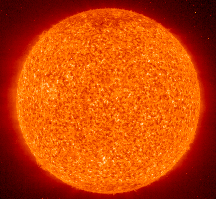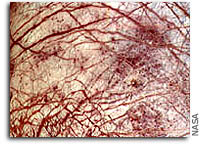
 |
|
#1
|
|||
|
|||
|
The Sun :
 The sun is the focal point of our solar system that all the planets revolve around. It a star, like any other in the night sky. It is also 'freaking huge', accounting for 99% of the mass of our solar system. It is made up of 3 quarters hydrogen and one quarter helium. The sun is roughly 1/3rd the age of the universe, at a timely 4.6 billion years. In another 4 or 5 billion years it will become a red giant. Mercury :  Mercury is very hot. Note quite as hot as venus but it does have the most extreme range of temperatures, from 90K to 700K, so if you do visit, remember the sun screen. Skin cancer is no joke. As you can see above it is quite cratered (reminiscient of the moon). It is also a very old planet. It is also much denser than the moon, nearly the density of Earth. Mercury also contains some unexplained smooth plains. Venus :  The historic home of women. Aside from the sun and the moon it is the brightest object in the sky and has been noticed since prehistoric times. Venus has an atmosphere that is extremely dense. The pressure is '90 atmospheres' which can be equated to the pressure at 1km below the ocean. The atmosphere is primarily carbon dioxide. It is thought by some that Venus once contained water but that it has long boiled away. In many ways, Venus is like the long lost sister of Earth. Both the Earth and Venus are thought to have relatively 'young' surfaces. Our densities and chemical compositions are similiar and for a while it was thought that because of Venuses dense clouds life may exist there. If Earth were a little closer to the sun there is a good chance our planet would have turned out like Venus did. Earth :  You're all undoubtably familiar, to some degree, with this planet. It is dominated by a strange bipedal named 'man'. It is awash in water and host to an incredible collection of life. Mars :  The red planet has some very interesting terrain. It hosts the largest mountain in the solar system 'Olympus Mons', which rises 24km above the surrounding plain. Mount Everest eat your heart out. It is also home to Tharsis, a huge bulge on the Martain surface that is about 4000 km across and 10 km high. Some claim there is clear evidence of erosion in many places on Mars including large floods and small river systems. While it is natural to assume that if erosion took place it was water that did it there are other possibilities. Mars has a tiny atmosphere composed primarily of carbondioxide (95%) and a grab bag of nitrogen, argon, oxygen and a very minute amount of water. The average pressure on the surface is less than 1% of Earth's atmosphere. Mars also has ice caps. It is often argued that there was once life, in some form, on Mars but there has been no conclusive proof one way or another. Mars also has two moons, Phobos and Deimos. Jupiter :  Jupiter is freaking huge. It is also the fourth brightest object in the sky. It also suffers from a terrible gas problem; that is to say it doesn't actually have a solid surface like Earth, rather as you get closer and closer to the middle the gas gets denser and denser. It is also thought to maybe have a CORE of rocky material amounting to 10-15 earth masses. It is 90% hydrogen and 10% helium, similiar to a degree to the make up of the sun. One of the coolest aspects of Jupiter is the great red spot.  The great red spot is thought to be a hurricaine which has been raging for 400 years. Jupiter also has a gigantic magentic field. It's "magnetosphere" extends more than 650 million km, which infact exceeds the orbit of Saturn! The moons of jupiter are within the reach of this force. Interestingly enough it is anything but spherical; it extends only a paltry few million kilometers in the direction of the sun. Jupiter also has a number of satellites and pretty much all of them are way cooler than the moon. Io is slightly larger than our moon. It is composed of molten silicon rock! Here's a pic.  Instead of craters, when Voyager 1 travelled by, they found hundreds of volcanic calderas (a caldera is a crater formed by an explosion or collapse of a volcanic vent). Some of these volcanoes are active. Io also has some pretty incredible terrain. It contains lakes of molten sulfar, non volcanic mountains and flows hundreds of kilometers long of some low viscosity fluid (sulfar?). Europa :  Europa is covered in ice. Underneath that ice it is theorized there is water and possibly life but that is speculation at this point. One of the most interesting aspects of Europa is the fact that it's surface is incredible smooth when compared to everything else in the solar system. There are very few features more than a few hundred meters high. I hope you enjoyed part one of my presentation! I will post part two hopefully sometime within the next week. |
|
#2
|
|||
|
|||
|
Very cool. You forgot one thing about Mars, though: apparently, Mars Needs Women!
|
|
#3
|
|||
|
|||
|
You missed a couple.
|
|
#4
|
|||
|
|||
|
[ QUOTE ]
You missed a couple. [/ QUOTE ] I hope you enjoyed part one of my presentation! I will post part two hopefully sometime within the next week. |
 |
|
|